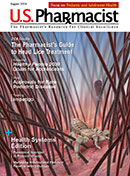The new guideline provides recommendations on selecting individuals eligible for screening, the quality of imaging and image interpretation, managing screen-detected findings, and the effectiveness of smoking-cessation interventions.
The lead author of the guidelines, Peter Mazzone, MD, MPH, FCCP, stated, "The goal of these guidelines is to assist stakeholders with the development of high-quality screening programs and arm clinical providers with the information necessary to engage at-risk individuals in order to increase the number of screenings. Outlined in the recommendations is who should be screened and what that screening process should look like from the clinical side. For an individual patient, these guidelines highlight the importance of education to foster informed, value-based decisions about whether to be screened."
Of the 16 recommendations, the key guidelines presented include the following: For asymptomatic individuals aged 50 to 80 years who have smoked 20 pack-years or more and either continue to smoke or have quit within the past 15 years, the experts recommend that annual screening with low-dose computed tomography (CT) be offered. The updated guidelines also suggest that low-dose CT screening programs develop strategies to expand compliance with annual screening exams and evaluation of screen-detected findings.
The experts also indicate that, for individuals who currently smoke and are undergoing low-dose CT screening, screening programs should provide evidence-based tobacco-cessation treatment as recommended by the U.S. Public Health Service. The full list of recommendations may be found here.
In the guideline, the authors wrote, "In this document, we have provided an update of the evidence related to the benefit and harms of lung cancer screening, as well as evidence that assists programs with selecting individuals to screen and implementing high-quality low-dose CT screening. Based on this review, we have developed recommendations where evidence allowed and consensus-based statements in areas that we felt warranted comment despite a lack of high-quality evidence. Future updates to this guideline are planned, with literature reviews every 3 months, and editing of the guideline when new evidence suggests recommendations and suggestions should change."
The content contained in this article is for informational purposes only. The content is not intended to be a substitute for professional advice. Reliance on any information provided in this article is solely at your own risk.
« Click here to return to Lung Cancer Update.






